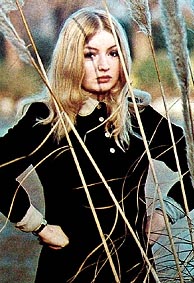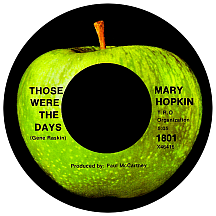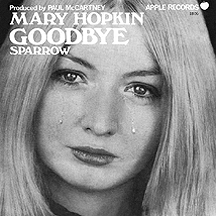MARY HOPKIN
Those Were the Days
Late one evening in the mid-'60s, Paul McCartney caught a set by a folk act from New York City, Gene and Francesca, at a nightclub in London. One song the duo performed was "Those Were the Days," a melodic tune with lyrics implying a sort of wartime nostalgia ('We'd sing and dance forever and a day...we'd live the life we choose...we'd fight and never lose...'). Paul felt it would be a good one to record, not with The Beatles necessarily, but the right type of artist who could transform the folk song into a pop hit. A few years later he found a singer unsuited, it would seem, to the sentimental narrative of a world-weary person's reminiscence, but the five-minute-long end result, sung by an 18-year-old Welsh girl, connected with millions around the globe.
As a teenager in Pontardawe, a small town near the coastal city of Swansea in the south of Wales, Mary Hopkin developed a love of folk music and Joan Baez in particular, whose guitar playing and vocal style she emulated quite well. For a time she sang with three male schoolmates as The Selby Set and Mary and was, by early 1968, making records on her own for a small local label, Cambrian, doing Cymraeg (Welsh language) versions of songs like the Debbie Reynolds hit "Tammy" ("Tami") and Pete Seeger's "Turn, Turn, Turn" ("Tro, Tro, Tro"). By the spring of '68 she was performing in some of the area's pubs, appeared on a TV show (on a low-power station just recently established in the area) and had released an EP on Cambrian as a duo with Welsh folk singer Edward Morris Jones. Resisting her agent's suggestion that she appear on the U.K. talent competition Opportunity Knocks, a long-running ITV series glibly hosted by actor Hughie Green, she soon found herself there anyway, right in the middle of the show's circus-like atmosphere. In May, the just-turned-18-year-old sang "Turn, Turn, Turn" (in English this time) and handily won the largest percentage of the viewers' votes, which led to weekly appearances and more ballot-busting call-in wins thanks to the show's fans!
British supermodel Twiggy was one of those viewers (though there's no telling whether she actually voted) and a friend of McCartney's; lunching with Paul a day or two later she raved about the young singer, so he watched the show the following week and decided to get in contact with Mary to set up an audition with the Beatles' record label, Apple, in its formative stages at the time. "Those Were the Days" became her debut single; unbeknownst to Paul, Gene Raskin (of Gene and Francesca) had lifted the melody from a Russian song, "Dorogoi Dlinnoyu" (English translation: "By the Long Road"), composed in the 1920s by Boris Fomin with lyrics by Konstantin Podrevskyi. The earliest renditions were recorded in Russian by contralto Tamara Tsereteli, a Georgian singer of gypsy melodies, in 1925, and in slightly modified form by Russian singer-actor Alexander Vertinsky in '26; his interpretation was remade by a number of artists over the years including Manchurian-born, Paris-based singer-guitarist Ludmila Lopato, who sang it in the 1953 British film Innocents in Paris.
Raskin came up with an entirely different set of lyrics, in English, telling the tale that's now so commonly known of '...a tavern where we used to raise a glass or two.' Glenn Yarbrough's group The Limeliters recorded their folk version in 1962, released by RCA Victor on the album Folk Matinee showing Raskin as the sole composer; neither Foman or Podrevskyi received royalties from this or subsequent versions. McCartney arranged Hopkin's recording of the song in a way she was not accustomed to. A full orchestra was used: guitar, banjo, harpsichord, tuba, horn pipes, a string section and backing chorus, a big-sounding production number surrounding Mary's melancholy reading of lyrics more suitable to someone well beyond her years (a line from the Limeliters' version, 'In the glass I saw a strange reflection...was that lonely stranger really me?' was changed to '..lonely woman really me?').
A near-identical cover by Sandie Shaw appeared suddenly, but she couldn't compete with the public's curiosity about the new Beatles label and its soon-to-be star discovery. Mary's disc, the first on Apple in Britain and second in the U.S. after "Hey Jude," trailed that Beatles blockbuster by a couple of weeks, knocking it off the number one spot in the U.K. in the fall of '68. In the U.S. it reached number two on Billboard's chart behind "Jude," while in Cash Box it duplicated its Brit feat. With the appearances on Opportunity Knocks she had become a star in the isles; with a hit single (released worldwide, her vocals in some cases translated into other languages) she became a star everywhere.

Comparisons to Baez went by the wayside as Hopkin found her own voice. McCartney, apparently, was too busy to throw himself fully into her career (the Beatles' "White Album" came out near year's end) and several months went by before Mary, after a fair amount of needling, recorded a second single. "Goodbye," a song penned by Paul but credited, as was the usual routine, to John Lennon and McCartney, was more uptempo than its predecessor, with Paul supplying percussion by slapping his thigh throughout. A hit despite the wait, it reached number two in England in the spring of '69 (the Fab Four's "Get Back" holding it back) and top 20 in the States. Several months passed during which time her debut album Post Card sold well (and back in Wales, Cambrian released more early recordings). Third single "Temma Harbour," written by Philamore Lincoln of Brian Auger and the Trinity and produced by Mickie Most, is a sweet little tune describing an idyllic, tropical place that is actually a remote location on the western coast of the Australian island Tasmania; it went top ten in Britain and top 40 in America in early 1970. From this point on, Mary was extremely unhappy with the music she was being pressured into doing; it wasn't really folk, which was her main focus regardless of whether it brought her success.
In her eyes, things only got worse. Her managers entered her as the U.K. representative in the 1970 Eurovision Contest held in March in Amsterdam. Pitted against entrants from eleven other countries, she sang the John Carter-Geoff Stephens tune "Knock Knock Who's There," which she considered "dreadful." A second place showing (losing to "All Kinds of Everything" by Brit singer Dana, representing Ireland) spared her, at least, the embarrassment of winning a competition she regarded as pointless, though the song became another huge U.K. hit. McCartney had already lost interest in Mary when the summer single "Que Sera, Sera (Whatever Will Be, Will Be)" (the 1956 Doris Day smash penned by Jay Livingston and Ray Evans) came out in the U.S.; it had been recorded the previous year with Paul on guitar and Ringo Starr on drums, but had only mild success.
"Think About Your Children," a song by Tony Wilson, Errol Brown and Margaret Wilson (all connected to U.K. band Hot Chocolate) and produced by Most, was Mary's last big hit in late 1970. "Let My Name Be Sorrow" was the final Apple single to chart in Britain in '71; a reissue of "Knock Knock Who's There" appeared on the charts in the U.S. in December '72. Prior to that, she had begun working with Tony Visconti, who produced a remake of The Jamies' '58 hit "Summertime, Summertime" for Bell Records that she'd done as part of the group Hobby Horse. Later she and Visconti created the folk album Earth Song/Ocean Song, personally her most satisfying work, at about the time Apple was starting to fall apart. They married and Tony produced Mary's records on Regal Zonophone and his own Good Earth label, landing her back in England's top 40 in 1976 with "If You Love Me," a Europop interpretation of Kay Starr's 1954 hit. In the years since, Mary Hopkin has recorded on and off and has made peace with her frustrating association with Paul McCartney and the Apple label, a problematic period of her life she deemed "demoralizing," suggesting stardom isn't necessarily as glamorous at it may appear.



